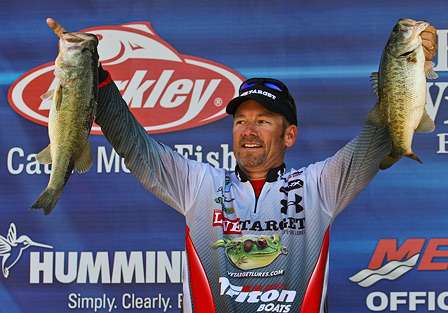
TAVARES, Fla. — Despite our penchant for wanting to know the exact winning lure, the exact location where the big fish was caught and the exact particulars of the equipment used, when it gets down to the basics of tournament bass fishing, it is the decisions made or not made that are the true backbone of this sport.
Some decisions are simple, others are so complex even anglers on the winner’s podium can’t always explain the depth of their importance.
Why do you go here? Why do you stay? Why do you settle on one lure over another? They all play a part in the success and failure of every angler who chooses to play this game.
While they are present in every bass tournament, those made during the Sunshine Showdown are a perfect example of the fickle nature of decision-making and how they play a part in the outcome of an event.
Stephen Browning and Grant Goldbeck each made decisions during the course of this last event that are prime examples.
Goldbeck finished second while Browning was third. While the standards for accurate decision making usually deal with the winner of an event, those two may have completely fallen out of sight if not for decisions made during the course of the event.
Goldbeck’s is well-known. He could have been written off as a contender in this event after Day One, when he made a bad decision and wound up in next to last place. He turned things around by simply going back to a magical pond and made things happen.
(Read What If? …)
While Goldbeck basically made a no-brainer considering the circumstances, Browning gets the award for the making the decisions that we can all learn from.
Day One and Day Two Browning fished in the Yale Marsh, where he was second and third respectively. Those finishes were a result of unplanned, split-second decision making.
“I was the last boat out of the lock that morning,” Browning said. “By the time I got to the canal leading to that marsh, there were four boats in front of me.
“There were two cuts leading to that marsh. And I was wanting to go to the second cut. But the four boats in front of me headed straight there. I took the first one and wound up basically having my area to myself.”
He shared that water with Kevin Wirth, who he tied for second place. The other end of the marsh, near the second cut, had about 15 boats in it.
“It was just a split-second deal, and a decision that I knew I had to make,” Browning said
Obviously it worked out for him. He spent two days there and stayed within the top three after Day Two.
But on Day Three, when the average angler would say “I have to go back,” Browning simply abandoned that area and took a left turn instead of a right.
It was a fortuitous decision, one that had those watching thinking “what in the world is he thinking?”
“After that second day I knew I was running out of fish,” Browning said. “I had a gut feeling that it wouldn’t hold up a third day. I’ve been there before and told myself ‘I had to go.’ And when it didn’t work out I spent the rest of my time second-guessing myself.
“I was having those same thoughts, remembering all the times I’ve had my butt kicked by not doing what my gut told me to do. I could say ‘I have to go back,’ but at the same time I knew that I didn’t have to go back. All I had to do was decide to not to do that.”
That was his decision. A lot of his thought process came from the 2010 Elite opener on the California Delta when he lead on Day One; his gut told him to move in that event, but he didn’t and wound up capturing only one keeper the next day.
In the Yale Marsh, Wirth and Cliff Crochet went back. Wirth dropped out of the final-day cut and Crochet made it, but he failed to catch a keeper in the final.
“I knew in my heart I couldn’t make it work there, so I went to an area where I had enough confidence that I could keep up the pace,” Browning said.
That place was Lake Dora, almost within sight of the check-in dock, where he sacked two 16-pound plus stringers on the final two days to give him a third-place finish.
He knows he couldn’t have won. But in a game where points lead to a Classic and/or playoff berth, that last-minute decision to abandon what was working proved critical to that top finish.
“Decisions are critical on the water,” he said. “Starting places, bait choices and everything in between, it’s all critical. When you have a gut feeling, chances are your gut is right and you should follow that, especially if you have the experience in knowing how these things can play out.
“The guys who do well day in and day out, they make a lot of decisions. They know their success is dependent on their experiences from years past, not just days past.”
Michael Iaconelli calls it “fishing the moment.” Rick Clunn used to say it’s like taking a “cue in a play.”
“When you are on a body of water for a week, like we are, things are going to change,” Browning said. “You have to change with them.
When you do that, you catch more. It’s not exactly as if you are fishing better, you just catch more. And that is how you win.”

